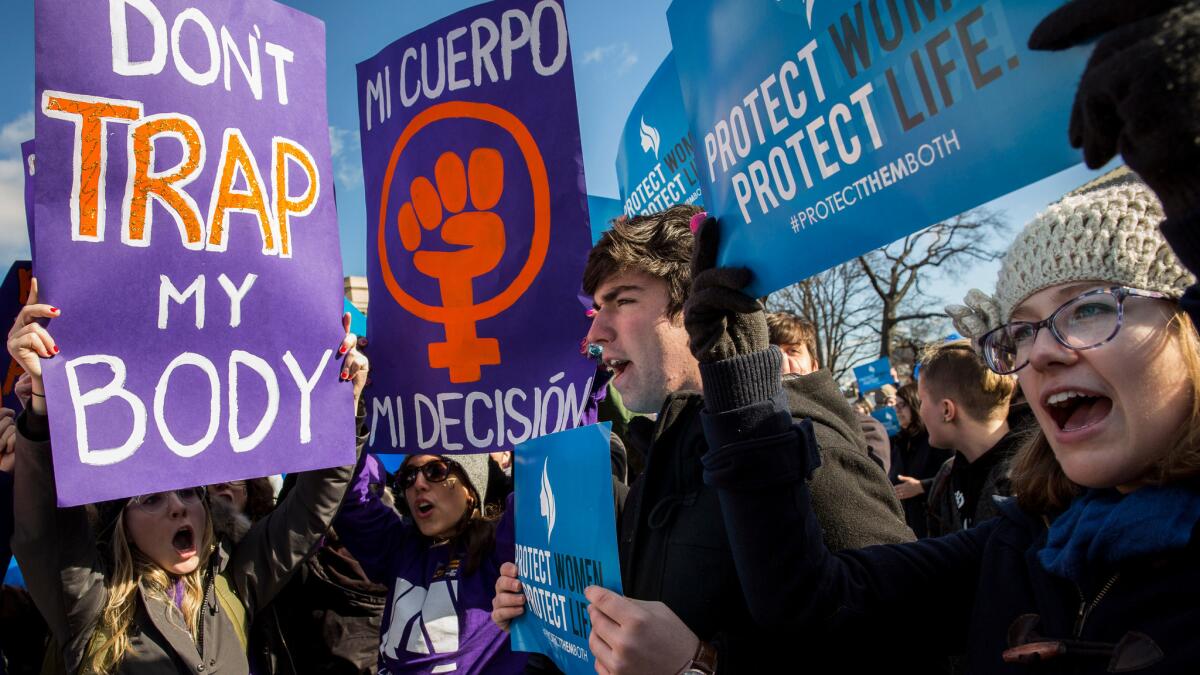Column: Do women regret their abortions? Absolutely not!

Of all the annoying arguments trotted out against legal abortion, the most irksome of them is the claim that women need to be protected from themselves, that they will act rashly to terminate unwanted pregnancies and then spend the the rest of their lives regretting it.
Such nonsense has even found its way into Supreme Court decisions on abortion. In 2007, in a decision upholding a law banning so-called partial-birth abortions, Justice Anthony Kennedy wrote that âsome women come to regret their choice to abort the infant life they once created and sustained,â despite the fact, as even he acknowledged, that the court found âno reliable data to measure the phenomenon.â
We finally have that reliable data, however, and it means we can put the notion of âabortion regretâ to rest.
As it turns out, the vast majority of women are grateful for their abortions. They are relieved by their abortions. They do not regret their abortions.
We know this thanks to a long-term study conducted by scientists at UC San Franciscoâs Bixby Center for Global Reproductive Health. The study examined differences between women who had abortions and women who were refused abortions because their pregnancies were too advanced.
A number of papers have been generated by the study, which included 1,000 women at the outset.
A book, by lead researcher Diana Greene Foster, is in the works. And one of the final papers from the study was recently published in the journal Social Science and Medicine.
It definitively disproves the paternalistic claim, often advanced by abortion foes, that abortion harms women by causing negative emotions like regret and guilt.
âTons of studies have found that relief is the most common short-term emotion after abortion, despite mixed emotions,â said the paperâs lead author, UCSF epidemiologist Corinne Rocca. âBut even after five years, when emotions are pretty low, relief is still the most common one.â
She found that about 99% of women who had abortions told researchers five years later that theyâd made the right decision.
The study, which interviewed women one week after their abortions, then twice a year for five years, also found that womenâs negative emotions often correlated with the amount of stigma they felt in their communities, not with the procedure itself.
Some women, naturally, dropped out of the study over the five years, leading critics to suggest that these were women who felt regret, shame or guilt about having abortions. But Rocca closely analyzed who dropped out and did not find a correlation between dropouts and negative emotions.
âPeople can make that claim,â she said, âbut I didnât find any of that.â
Over the years, conservative states with male-dominated legislatures have found ways to chip away at the right to abortion with new restrictions.
The Supreme Court has allowed many of those limits to stand â as long as they do not pose an âundue burdenâ on women â while ultimately protecting the legality of the procedure.
However, just like pornography, what constitutes an âundue burdenâ is in the eye of the beholder.
Is it an undue burden to force minors to get parental consent? The Supreme Court said no. Is it an undue burden to force a woman to wait 24 hours before she receives an abortion? No. Is it an undue burden to force women to inform their husbands? Yes.
Since the U.S. Supreme Court now has a conservative majority, I fear the foes of reproductive freedom will finally prevail in their quest to force women back to a punitive time when the law denied them control over their own lives and wombs.
So far, the signals are distressing.
In December, the court refused to hear a challenge to a Kentucky law that requires doctors to describe ultrasound images to abortion seekers, and forces pregnant women to listen to the fetal heartbeat, whether they want to or not.
Kentucky lawmakers call this blatantly political intrusion on the doctor-patient relationship âinformed consent.â
Among the many challenges to Roe vs. Wade in the Supreme Court pipeline is one that justices are likely to hear this term: They will be asked to uphold a Louisiana law that requires doctors who perform abortions to have admitting privileges with nearby hospitals. The rub, of course, is that hospitals can and often do refuse to give abortion doctors such privileges.
Why is this case so alarming?
Because in 2016, the Supreme Court struck down, on a 5 to 3 vote, a very similar Texas law, finding that it did nothing to improve womenâs health and instead imposed on them an undue burden.
In his majority opinion, Justice Stephen Breyer noted that when he asked during oral arguments whether Texas officials knew of a single instance where the new law would have helped a woman obtain better treatment, they could not offer any evidence.
Justice Anthony Kennedy, the swing vote in that case, is no longer on the court.
He has been replaced by Brett Kavanaugh, who has given no indication that he agrees with the courtâs precedent in Roe vs. Wade. Many people on both sides of the abortion debate believe he would probably overturn it given the chance.
Sadly for women, it looks like heâs about to be given that chance.
@AbcarianLAT
More to Read
A cure for the common opinion
Get thought-provoking perspectives with our weekly newsletter.
You may occasionally receive promotional content from the Los Angeles Times.











